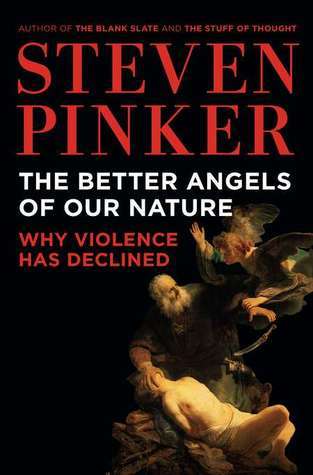
Selected by The New York Times Book Review as a Notable Book of the Year. The author of The New York Times bestseller The Stuff of Thought offers a controversial history of violence. Faced with the ceaseless stream of news about war, crime, and terrorism, one could easily think we live in the most violent age ever seen. Yet as New York Times bestselling author Steven Pinker shows in this startling and engaging new work, just the opposite is true: violence has been diminishing for millennia and we may be living in the most peaceful time in our species' existence. For most of history, war, slavery, infanticide, child abuse, assassinations, pogroms, gruesome punishments, deadly quarrels, and genocide were ordinary features of life. But today, Pinker shows (with the help of more than a hundred graphs and maps) all these forms of violence have dwindled and are widely condemned. How has this happened? This groundbreaking book continues Pinker's exploration of the essence of human nature, mixing psychology and history to provide a remarkable picture of an increasingly nonviolent world. The key, he explains, is to understand our intrinsic motives- the inner demons that incline us toward violence and the better angels that steer us away-and how changing circumstances have allowed our better angels to prevail. Exploding fatalist myths about humankind's inherent violence and the curse of modernity, this ambitious and provocative book is sure to be hotly debated in living rooms and the Pentagon alike, and will challenge and change the way we think about our society.
Author

Steven Arthur Pinker is a prominent Canadian-American experimental psychologist, cognitive scientist, and author of popular science. Pinker is known for his wide-ranging explorations of human nature and its relevance to language, history, morality, politics, and everyday life. He conducts research on language and cognition, writes for publications such as the New York Times, Time, and The New Republic, and is the author of numerous books, including The Language Instinct, How the Mind Works, Words and Rules, The Blank Slate, The Stuff of Thought, The Better Angels of Our Nature, The Sense of Style, and most recently, Enlightenment Now: The Case for Reason, Science, Humanism, and Progress. He was born in Canada and graduated from Montreal's Dawson College in 1973. He received a bachelor's degree in experimental psychology from McGill University in 1976, and then went on to earn his doctorate in the same discipline at Harvard in 1979. He did research at the Massachusetts Institute of Technology (MIT) for a year, then became an assistant professor at Harvard and then Stanford University. From 1982 until 2003, Pinker taught at the Department of Brain and Cognitive Sciences at MIT, and eventually became the director of the Center for Cognitive Neuroscience. (Except for a one-year sabbatical at the University of California, Santa Barbara in 1995-6.) As of 2008, he is the Johnstone Family Professor of Psychology at Harvard. Pinker was named one of Time Magazine's 100 most influential people in the world in 2004 and one of Prospect and Foreign Policy's 100 top public intellectuals in 2005. He has also received honorary doctorates from the universities of Newcastle, Surrey, Tel Aviv, McGill, and the University of Tromsø, Norway. He was twice a finalist for the Pulitzer Prize, in 1998 and in 2003. In January 2005, Pinker defended Lawrence Summers, President of Harvard University, whose comments about the gender gap in mathematics and science angered much of the faculty. On May 13th 2006, Pinker received the American Humanist Association's Humanist of the Year award for his contributions to public understanding of human evolution. In 2007, he was invited on The Colbert Report and asked under pressure to sum up how the brain works in five words – Pinker answered "Brain cells fire in patterns." Pinker was born into the English-speaking Jewish community of Montreal. He has said, "I was never religious in the theological sense... I never outgrew my conversion to atheism at 13, but at various times was a serious cultural Jew." As a teenager, he says he considered himself an anarchist until he witnessed civil unrest following a police strike in 1969. His father, a trained lawyer, first worked as a traveling salesman, while his mother was first a home-maker then a guidance counselor and high-school vice-principal. He has two younger siblings. His brother is a policy analyst for the Canadian government. His sister, Susan Pinker, is a columnist for the Wall Street Journal and the author of The Sexual Paradox and The Village Effect. Pinker married Nancy Etcoff in 1980 and they divorced 1992; he married Ilavenil Subbiah in 1995 and they too divorced. He is married to the novelist and philosopher Rebecca Goldstein, the author of 10 books and winner of the National Medal of the Humanities. He has no children. His next book will take off from his research on "common knowledge" (knowing that everyone knows something). Its tentative title is: Don't Go There: Common Knowledge and the Science of Civility, Hypocrisy, Outrage, and Taboo.